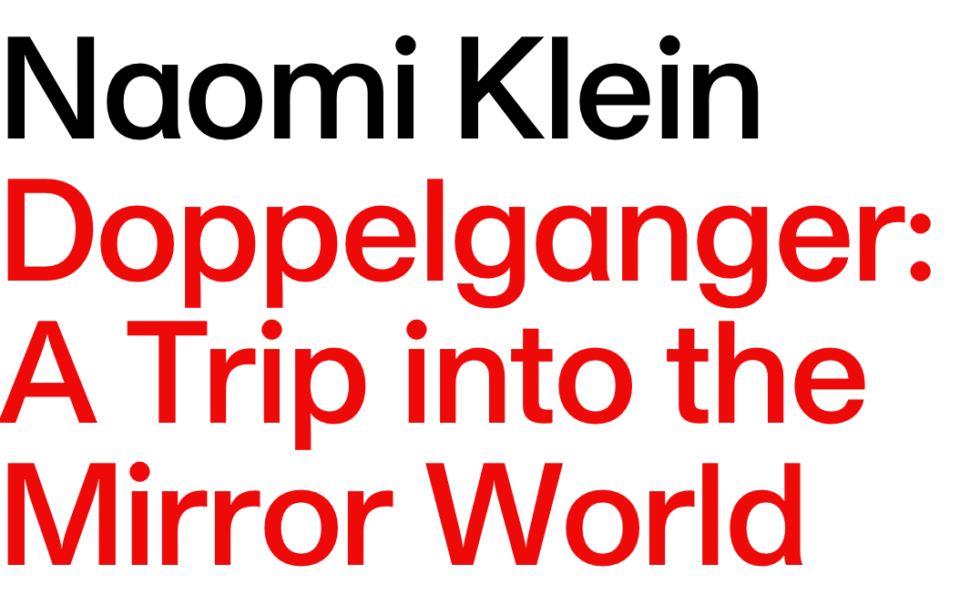My review in today’s The Saturday Paper newspaper about Naomi Klein’s new book, Doppelgänger:
We all know people who have vanished into a world of conspiracy and disinformation. This is more extreme than believing, for example, that the 1969 Apollo 11 moon landing was faked or that the 9/11 terror attacks in New York and Washington, DC, were committed by United States government insiders.
These lies almost seem quaint in the modern world. It’s a mistake to romanticise the pre-internet era – far fewer voices were heard in the mainstream media and people of colour were often rendered invisible – but the 21st century has radically unsettled how we access information. Social media polarisation, right-wing populism and tabloid hackery inflame their publics and real, communal consensus is often impossible to obtain. Simply agreeing on the facts about Covid-19, vaccines, Palestine, neoliberalism, transgenderism or colonialism is now a herculean task as toxic untruths are mixed with verifiable details across our Balkanised media landscape.
But what if the left is partly to blame for this precarious moment? Has smugness cost us potential allies in the fight for climate, pandemic and economic justice?
Canadian writer Naomi Klein – author of No Logo, The Shock Doctrine, This Changes Everything: Capitalism vs the Climate and other books – attempts to address these questions in a fascinating examination of the “mirror world” where truth and lies are interchangeable.
Her entry point at first seems trivial and surprisingly personal. Many people have confused Klein with feminist activist and writer Naomi Wolf, praising and abusing Klein for Wolf’s writings and tweets. The confusion runs deep: when I recently told a friend about Klein’s new book, he said she’d “gone down the rabbit hole” – but he thought I was talking about the “Other Naomi”.
Wolf was once nominally on the centre-left but today is embraced by far-right former Trump strategist Steve Bannon, and is a regular guest on his War Room podcast. For years, Klein explains, “Other Naomi” has become “one of the most effective creators and disseminators of misinformation and disinformation about many of our most urgent crises”. She says Wolf has inspired many people to take to the streets to protest an almost wholly imaginary “tyranny”. “The confusion they sow and the oxygen they absorb increasingly stand in the way of pretty much anything helpful or healthful that humans might, at some point, decide to accomplish together.”
What unfolds is a refreshingly honest and at times critical appraisal of the anti-corporate message espoused by Klein and the left and how it’s been thoroughly co-opted by Wolf and others in the 2020s. When Wolf condemned the power of Big Tech, Klein writes, “she began tapping into deep and latent cultural fears about the many ways that previously private parts of our lives have become profit centres for all-seeing Silicon Valley giants”.
Klein finds it distinctly uncomfortable that many of her arguments against the insidious power of corporations and Big Tech – research that she’s used to great effect over the decades to skewer rapacious companies for exploiting fear in times of crisis – are being distorted and amplified by the right to attract huge numbers of followers. Wolf has jumped on this profitable bandwagon. Klein cautions against abuse of the Other Naomi because in the end the real threat isn’t Wolf but the alliances that she’s courting. Avoid smugness.
Although Wolf’s proposals and theses are “essentially fantasy” – she’s said the Covid-19 vaccine and its alleged connections to mass murder are comparable to the actions of “doctors in pre-Nazi Germany” – “emotionally, to the many people now listening to her, they clearly felt true”. Feelings over reason. Call it truthiness, the idea that something feels true even if it’s definitely not.
What Wolf has become spectacularly good at is chasing clout. She embraces it – especially if it’s from previous “enemies” on the right such as Tucker Carlson – and always searches for more. “Clout is the values-free currency of the always-online age,” says Klein. “Both a substitute for hard cash as well as a conduit to it.” Clout is a never-ending renewable resource and the more people exist on multiple online platforms, the more it grows.
The strength of Doppelganger is that it leaves us uncomfortable. Klein is correct when she writes that the millions of people who embrace “fantasy” view the rest of us as living in a “clown world”, stuck in “groupthink”. There’s little middle ground between the two warring parties. But – and this is just one example among many – it’s reasonable to ask why there was so much pushback on the left to the idea that Covid-19 was born in a Wuhan lab and not a wet market. To this day, we still don’t know with certainty if the “lab leak” theory is completely bogus or has a skerrick of truth. Banning discussion on social media pushed many sceptics into the arms of Wolf, Bannon and the many others selling their illusion of challenging “tyranny”.
The challenge for those who don’t subscribe to these wild messages is, as Klein powerfully details, “however untethered from reality, [Wolf’s ideas] tap into something true”. Klein issues a call to arms in this book, a brilliantly incisive and unsettling work that reflects the urgency our times demand. With far-right populism on the march, from Israel to India to Hungary to the United States, it’s clear the left needs new tools to fight and resist. This is an essential guide.
Allen Lane, 352pp, $36.99
Here’s the PDF of the review: satpaperdoppelgangerreview
